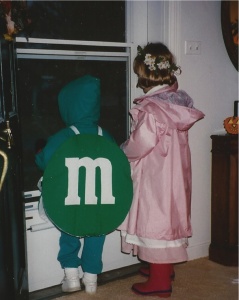Last week I watched a “TED Talk” presentation of UK teenager Rosie King discussing her autism, emailed to me by a friend. It was titled, “How autism freed me to be myself.”
Rosie has made a splash since her “self-diagnosis” at age nine, later confirmed by doctors as Asperger syndrome, and her “burning desire to help make the world a more tolerant place for people with autism.” Described as a “storytelling activist” by the TED site, “Rosie King challenges stereotypes of people with autism and contextualizes the issue by asking us, ‘Why be normal?’”
Perhaps it wasn’t the best time for me to be asked that question.
Earlier that day my husband and I visited my son at his group home in Wisconsin, planning, at the suggestion of one of his caregivers, to take him for a much-needed haircut.
This is more complicated than it sounds. As I’ve written about frequently, Daniel’s rigidity makes any divergence from routine a dicey, even harrowing proposition. Taking him into the community for any reason is a challenge none of us take lightly.
At nearly six feet tall, he is a force to be reckoned with when agitated. We brace for our outings these days. Without warning my son with autism can become aggressive and out of control, grabbing, lashing out, even biting those in his path.
Accompanied by his caregiver, however, we had Dan’s hair cut at a Great Clips in town. It was a successful outcome this time, but only in retrospect. That small task was a stressful, intense ordeal, as so many of our experiences with Daniel have been since the day he was born.
I wish this wasn’t true. I wish more than anything that he was not burdened with a disorder that makes so much of his life challenging, that causes him to behave in ways I’m certain leave him as distraught as we are.
I wish a simple haircut was routine.
But this isn’t the pattern of our world. Daniel isn’t “normal.” And that isn’t something I feel like celebrating.
Rosie King’s TED Talk underscores the broad spectrum that autism, as defined by the medical establishment, now encompasses. That she could speak so confidently to an audience of over a thousand demonstrates this. Her “autism” bears so little resemblance to the autism I know, however, that it was more like watching a very bright woman describe her thought processes than listening to any person with true autism that I’ve ever encountered.
Her premise, as I understand it, is that society must move toward greater open-mindedness and be less prone to labeling. She recounted her school experiences, her heightened ability to communicate with her non-verbal autistic siblings, the myriad ways in which embracing her differentness has enhanced her life. She got a big laugh when she remarked, “What if the biggest compliment you ever received was, ‘You’re so normal?’” She challenged society’s assumption that “different,” as in “autistic,” is a detriment at all.
This attitude is popular among an increasingly vocal segment of the autism community, with many “higher functioning” autistic people and their advocates insisting that autism isn’t a disorder but a different way of thinking, denouncing the stigma of disability and the stereotyping the word autism brings.
I have no problem with that, in itself. Of course none of us should be defined or restricted by others’ perceptions. I am in favor of “thinking outside the box,” as Rosie King champions, of all persons being free to explore and achieve their highest potential. Who isn’t?
Except that vocal faction, represented by Rosie King’s “autism” speech, paints a terribly misleading picture of what true autism really is, the devastation and ruined lives it leaves in its wake. And that is harmful to the vast numbers of those suffering from the ravages of classic or severe autism. It skews the perception of the serious and wide-ranging toll this disorder takes, and influences those with authority to direct help to the people who desperately need it.
After her speech hit the internet, Rosie King was lauded for her stirring message. Trendinghashtag.com reported some of the comments Tweeted around the globe:
“Why make everyone normal when we can celebrate imagination! Rosie King!”
“Proud young Rosie King with autism: what if the biggest compliment you received was, you’re normal? She is extraordinary.”
“Rosie King reminds us to put the PERSON first. One of the most inspirational + REAL talks I’ve ever heard.”
Real in Rosie’s world of autism, perhaps. But not the world of autism I, and many of my friends, are living in right now.
That kind of autism isn’t quite so inspiring.
It is an inexplicable tantrum during brunch at a restaurant where your teenaged daughter is waitressing, requiring paramedics and a trip to the hospital to treat bites your son has inflicted on both of you.
It is a woman seeking emergency care for her 20-year-old grandson while his mother undergoes a double mastectomy, only to be told his needs exceed the parameters of the very facilities meant to provide that care.
It is my friends’ son requiring seven people to hold him while general anesthesia is administered for a routine dental exam.
It is heavy-duty antipsychotic drugs prescribed by doctors like the one who told me last week that my son is “a young man with serious issues who has the potential to really hurt someone.”
It is specialized, lifelong care; it is the unrelenting question of what will happen when you die, of who will love your child as you do when you are gone.
It is therapies and medical scans and sleepless nights, bowel trouble and breath-holding and head-banging. It is scars and screaming and broken marriages.
It is loving your child beyond measure, while watching the fascinating, normal world pass him by.
It is being afraid to take your son for a haircut.
Autism may have freed Rosie King to be herself, to escape “the tiny boxes with specific labels” she decries. And that’s a wonderful thing.
Her “self” is pretty close to “normal,” though, compared to my son, or the tens of thousands of others living with classic autism. That very normalcy is what allows her to thrive. The attention she receives is due in large part to her achievements as an “autistic” person, the label she wishes not to define her.
And that is what is troubling to me, why I didn’t enjoy the video as my friend thought I would. Society sees her as an example of the limitless potential of those with autism, a happy autism success story. But in reality, those stories are rare.
Rosie King’s success is no less valid because she is “high functioning,” but it creates confusion for the majority of people unfamiliar with the spectrum nature of the disorder, who will hear the word “autism” and remember the remarkable teenager who overcame it. And that doesn’t happen very often with true autism.
One parent posted this comment on YouTube following the story: “Thanks for sharing. My 3.5 year old son is currently being assessed for autism… The worst fear we have as parents is having him labeled for the rest of his life. But this video has helped me alleviate some of that fear. I know he may be labeled by some, but others will see what a smart, loving person he is.”
My son is smart and loving, too, despite the behaviors he is capable of. Those who know him see that, too. Whether or not he is “labeled” won’t change the impact, however, of the disorder that has claimed him, or the many others like him. It doesn’t diminish the hideous consequences for those who cannot take the stage to tell their own stories.
I fear I offended my friend with my honest reply to his email, that while I appreciate his thinking of me, these kinds of stories are actually hard for parents to bear, the “why be normal?” mantra a kick in the teeth to those of us who’d give anything for “normal.” But if I want the truth as I know it to be understood, I have to be willing to share it, even when it is uncomfortable to do so.
Rosie King concluded her speech by declaring that she wouldn’t trade her autism for anything in the world. My inability to say the same about my son’s autism makes me defensive sometimes, as though I have to assure people that I wouldn’t trade my son for anything; that even if I knew what was coming almost 23 years ago I’d do it all again, for the joy Daniel has brought me as my son.
But that doesn’t mean I wouldn’t trade his autism for just about anything.
I’d take normal in a heartbeat.





